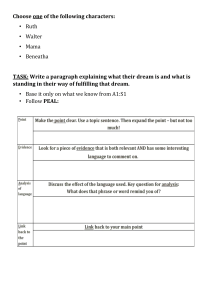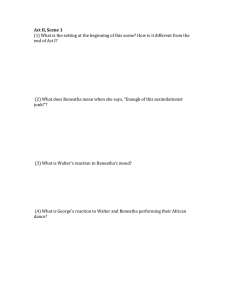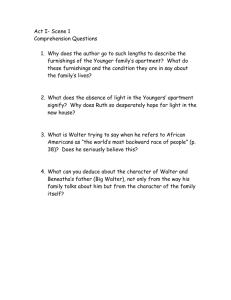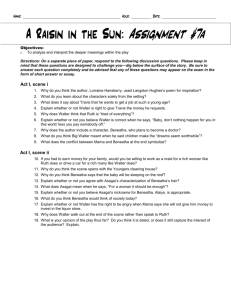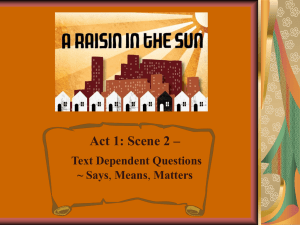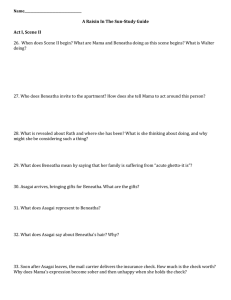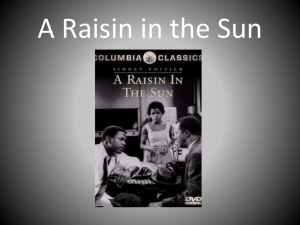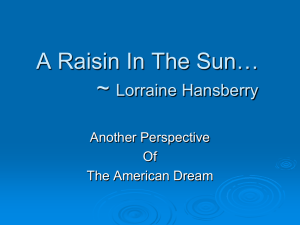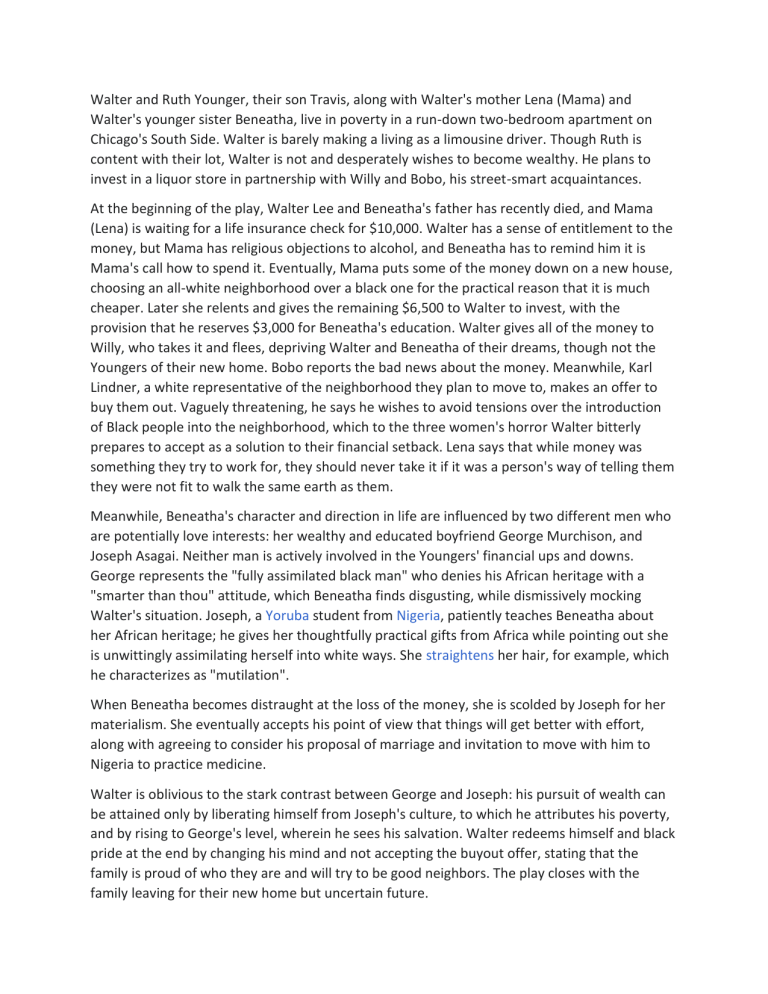
Walter and Ruth Younger, their son Travis, along with Walter's mother Lena (Mama) and Walter's younger sister Beneatha, live in poverty in a run-down two-bedroom apartment on Chicago's South Side. Walter is barely making a living as a limousine driver. Though Ruth is content with their lot, Walter is not and desperately wishes to become wealthy. He plans to invest in a liquor store in partnership with Willy and Bobo, his street-smart acquaintances. At the beginning of the play, Walter Lee and Beneatha's father has recently died, and Mama (Lena) is waiting for a life insurance check for $10,000. Walter has a sense of entitlement to the money, but Mama has religious objections to alcohol, and Beneatha has to remind him it is Mama's call how to spend it. Eventually, Mama puts some of the money down on a new house, choosing an all-white neighborhood over a black one for the practical reason that it is much cheaper. Later she relents and gives the remaining $6,500 to Walter to invest, with the provision that he reserves $3,000 for Beneatha's education. Walter gives all of the money to Willy, who takes it and flees, depriving Walter and Beneatha of their dreams, though not the Youngers of their new home. Bobo reports the bad news about the money. Meanwhile, Karl Lindner, a white representative of the neighborhood they plan to move to, makes an offer to buy them out. Vaguely threatening, he says he wishes to avoid tensions over the introduction of Black people into the neighborhood, which to the three women's horror Walter bitterly prepares to accept as a solution to their financial setback. Lena says that while money was something they try to work for, they should never take it if it was a person's way of telling them they were not fit to walk the same earth as them. Meanwhile, Beneatha's character and direction in life are influenced by two different men who are potentially love interests: her wealthy and educated boyfriend George Murchison, and Joseph Asagai. Neither man is actively involved in the Youngers' financial ups and downs. George represents the "fully assimilated black man" who denies his African heritage with a "smarter than thou" attitude, which Beneatha finds disgusting, while dismissively mocking Walter's situation. Joseph, a Yoruba student from Nigeria, patiently teaches Beneatha about her African heritage; he gives her thoughtfully practical gifts from Africa while pointing out she is unwittingly assimilating herself into white ways. She straightens her hair, for example, which he characterizes as "mutilation". When Beneatha becomes distraught at the loss of the money, she is scolded by Joseph for her materialism. She eventually accepts his point of view that things will get better with effort, along with agreeing to consider his proposal of marriage and invitation to move with him to Nigeria to practice medicine. Walter is oblivious to the stark contrast between George and Joseph: his pursuit of wealth can be attained only by liberating himself from Joseph's culture, to which he attributes his poverty, and by rising to George's level, wherein he sees his salvation. Walter redeems himself and black pride at the end by changing his mind and not accepting the buyout offer, stating that the family is proud of who they are and will try to be good neighbors. The play closes with the family leaving for their new home but uncertain future. Because of time constraints, the character Mrs. Johnson and a few scenes were cut from the Broadway performance and in reproductions. Mrs. Johnson is the Younger family's nosy and loud neighbor, at the beginning of the play. She cannot understand how the family can consider moving to a white neighborhood and cattily jokes that she will probably read in the newspaper in a month that they have been killed in a bombing. Her lines are employed as comic relief, but Hansberry also uses this scene to mock those who are too scared to stand up for their rights. In the introduction by Robert B. Nemiroff, he writes that the scene is included in print because it draws attention away from a seemingly happy ending to a more violent reality inspired by Hansberry's own experiences.
